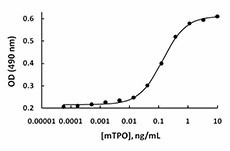- Regulatory Status
- RUO
- Other Names
- Megakaryocyte Colony Stimulating Factor (MKCSF), Myeloproliferative leukemia virus oncogene ligand (Mpl-ligand), Megakaryocyte growth and development factor (MGDF), THPO.

-

Mouse TPO (BL) induces proliferation of M-07e cells.
| Cat # | Size | Price | Quantity Check Availability | ||
|---|---|---|---|---|---|
| 593302 | 10 µg | $218.00 | |||
| 593304 | 25 µg | $382.00 | |||
| 593306 | 100 µg | $996.00 | |||
Mouse thrombopoietin (TPO) is a protein consisting of an N-terminus domain with homology to erythropoietin (EPO) and a C-terminus domain with multiple N-linked and O-linked glycosylation sites. TPO is a key regulator of megakaryocytopoiesis and thrombopoiesis. It signals through the c-mpl receptor and stimulates the proliferation and maturation of megakaryocytes, hence, TPO plays an important role in regulating the level of circulating platelets in vivo. It has also been shown that TPO is able to promote the survival, self-renewal, and expansion of hematopoietic stem cells and primitive multilineage progenitors. Besides its hematopoietic effects, TPO is expressed in the brain where it promotes the apoptosis of hypoxia sensitized neurons and inhibits neuronal differentiation by blocking NGF induced signaling.
Product Details
- Source
- Mouse TPO, amino acids (Ser22-Thr356) (Accession# NP_001166976.1) was expressed in CHO cell line.
- Molecular Mass
- Predicted molecular mass of approximately 35.5 kD. The protein migrates at about 40 kD in DTT-reducing conditions and about 35 kD in non-reducing condition by SDS-PAGE.The N-terminal amino acid is Ser.
- Purity
- >90%, as determined by Coomassie stained SDS-PAGE.
- Formulation
- 0.22 µm filtered protein solution is in PBS, pH 7.2.
- Endotoxin Level
- Less than 1.0 EU per µg of protein as determine by the LAL method.
- Concentration
- 10 and 25 µg sizes are bottled at 200 µg/mL. 100 µg size and larger sizes are lot-specific and bottled at the concentration indicated on the vial. To obtain lot-specific concentration and expiration, please enter the lot number in our Certificate of Analysis online tool.
- Storage & Handling
- Unopened vial can be stored between 2°C and 8°C for up to 2 weeks, at -20°C for up to six months, or at -70°C or colder until the expiration date. For maximum results, quick spin vial prior to opening. The protein can be aliquoted and stored at -20°C or colder. Stock solutions can also be prepared at 50 - 100 µg/mL in appropriate sterile buffer, carrier protein such as 0.2 - 1% BSA or HSA can be added when preparing the stock solution. Aliquots can be stored between 2°C and 8°C for up to one week and stored at -20°C or colder for up to 3 months. Avoid repeated freeze/thaw cycles.
- Activity
- Mouse TPO induces proliferation of M-O7e cells with a ED50 < 0.8 ng/ml.
- Application
-
Bioassay
- Application Notes
-
BioLegend carrier-free recombinant proteins provided in liquid format are shipped on blue-ice. Our comparison testing data indicates that when handled and stored as recommended, the liquid format has equal or better stability and shelf-life compared to commercially available lyophilized proteins after reconstitution. Our liquid proteins are verified in-house to maintain activity after shipping on blue ice and are backed by our 100% satisfaction guarantee. If you have any concerns, contact us at tech@biolegend.com.
- Product Citations
-
Antigen Details
- Structure
- Monomer
- Distribution
- TPO is produced by liver and kidney.
- Function
- TPO regulates megakaryocytopoiesis and thrombopoiesis.
- Interaction
- Megakaryocytes
- Cell Type
- Mesenchymal Stem Cells, Hematopoietic stem and progenitors, Embryonic Stem Cells
- Biology Area
- Apoptosis/Tumor Suppressors/Cell Death, Cell Adhesion, Cell Biology, Immunology, Stem Cells
- Molecular Family
- Growth Factors, Cytokines/Chemokines
- Antigen References
-
1. Avanzi G. et al. 1988. Br. J. Haematol. 69:359.
2. Deutsch V.R. and Tomer A. 2006. Br. J. Haematol. 134:453.
3. Kaushansky K. 2005. J. Clin. Invest. 115:3339.
4. Li J. et al. 1999. Br. J. Haematol. 106:345.
5. Kato T. et al. 1997. Proc. Natl. Acad. Sci. 94:4669.
6. Ehrenreich H. et al. 2005. Proc. Natl. Acad. Sci. 102:862. - Gene ID
- 21832 View all products for this Gene ID
- UniProt
- View information about Thrombopoietin on UniProt.org
